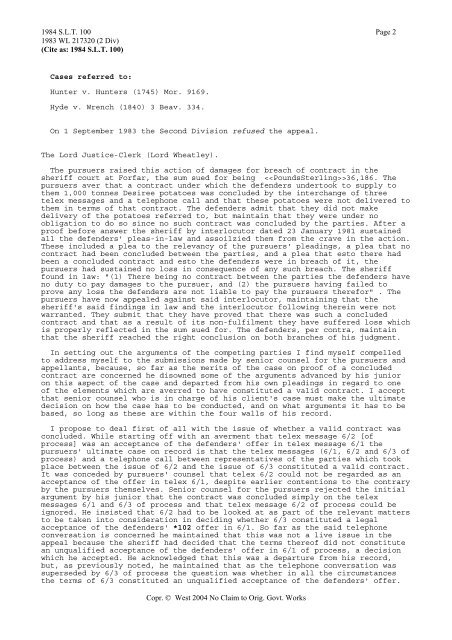Tesco v Constain - Thomson Reuters
Tesco v Constain - Thomson Reuters
Tesco v Constain - Thomson Reuters
Create successful ePaper yourself
Turn your PDF publications into a flip-book with our unique Google optimized e-Paper software.
1984 S.L.T. 100 Page 21983 WL 217320 (2 Div)(Cite as: 1984 S.L.T. 100)Cases referred to:Hunter v. Hunters (1745) Mor. 9169.Hyde v. Wrench (1840) 3 Beav. 334.On 1 September 1983 the Second Division refused the appeal.The Lord Justice-Clerk (Lord Wheatley).The pursuers raised this action of damages for breach of contract in thesheriff court at Forfar, the sum sued for being 36,186. Thepursuers aver that a contract under which the defenders undertook to supply tothem 1,000 tonnes Desiree potatoes was concluded by the interchange of threetelex messages and a telephone call and that these potatoes were not delivered tothem in terms of that contract. The defenders admit that they did not makedelivery of the potatoes referred to, but maintain that they were under noobligation to do so since no such contract was concluded by the parties. After aproof before answer the sheriff by interlocutor dated 23 January 1981 sustainedall the defenders' pleas-in-law and assoilzied them from the crave in the action.These included a plea to the relevancy of the pursuers' pleadings, a plea that nocontract had been concluded between the parties, and a plea that esto there hadbeen a concluded contract and esto the defenders were in breach of it, thepursuers had sustained no loss in consequence of any such breach. The sherifffound in law: "(1) There being no contract between the parties the defenders haveno duty to pay damages to the pursuer, and (2) the pursuers having failed toprove any loss the defenders are not liable to pay the pursuers therefor" . Thepursuers have now appealed against said interlocutor, maintaining that thesheriff's said findings in law and the interlocutor following therein were notwarranted. They submit that they have proved that there was such a concludedcontract and that as a result of its non-fulfilment they have suffered loss whichis properly reflected in the sum sued for. The defenders, per contra, maintainthat the sheriff reached the right conclusion on both branches of his judgment.In setting out the arguments of the competing parties I find myself compelledto address myself to the submissions made by senior counsel for the pursuers andappellants, because, so far as the merits of the case on proof of a concludedcontract are concerned he disowned some of the arguments advanced by his junioron this aspect of the case and departed from his own pleadings in regard to oneof the elements which are averred to have constituted a valid contract. I acceptthat senior counsel who is in charge of his client's case must make the ultimatedecision on how the case has to be conducted, and on what arguments it has to bebased, so long as these are within the four walls of his record.I propose to deal first of all with the issue of whether a valid contract wasconcluded. While starting off with an averment that telex message 6/2 [ofprocess] was an acceptance of the defenders' offer in telex message 6/1 thepursuers' ultimate case on record is that the telex messages (6/1, 6/2 and 6/3 ofprocess) and a telephone call between representatives of the parties which tookplace between the issue of 6/2 and the issue of 6/3 constituted a valid contract.It was conceded by pursuers' counsel that telex 6/2 could not be regarded as anacceptance of the offer in telex 6/1, despite earlier contentions to the contraryby the pursuers themselves. Senior counsel for the pursuers rejected the initialargument by his junior that the contract was concluded simply on the telexmessages 6/1 and 6/3 of process and that telex message 6/2 of process could beignored. He insisted that 6/2 had to be looked at as part of the relevant mattersto be taken into consideration in deciding whether 6/3 constituted a legalacceptance of the defenders' *102 offer in 6/1. So far as the said telephoneconversation is concerned he maintained that this was not a live issue in theappeal because the sheriff had decided that the terms thereof did not constitutean unqualified acceptance of the defenders' offer in 6/1 of process, a decisionwhich he accepted. He acknowledged that this was a departure from his record,but, as previously noted, he maintained that as the telephone conversation wassuperseded by 6/3 of process the question was whether in all the circumstancesthe terms of 6/3 constituted an unqualified acceptance of the defenders' offer.Copr. © West 2004 No Claim to Orig. Govt. Works
















